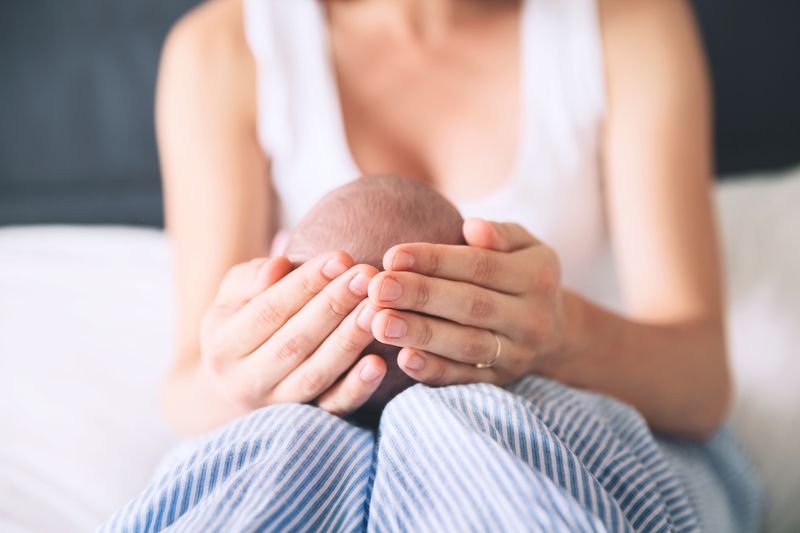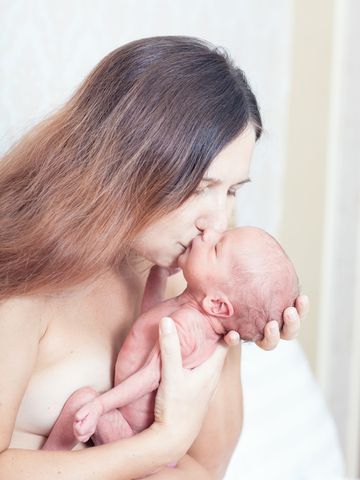Does Breastfeeding Shrink Your Uterus?
Did you know that the uterus of non-breastfeeding mothers will never shrink back? It will always remain slightly enlarged...

As weird as it sounds, the answer is yes. This is made possible by hormones. When you breastfeed, your pituitary glands secrete a hormone called Oxytocin. The function of this hormone is to contract smooth muscles, such as the milk sacs found in your breasts.
When the milk sacs contract, the milk moves to the front of the breast, making breastfeeding possible. Some mothers say they feel a tingling feeling. This is called the letdown reflex.
Oxytocin does not only contract the smooth muscles in your breasts but the smooth muscle cells in your uterus as well. This contracting of the muscles actually assists the uterus in shrinking to its original size.
The uterus of non-breastfeeding mothers will never shrink back. It will always remain slightly enlarged (Chua S, Arulkumaran S, Lim I, et al. 'Influence of breastfeeding and nipple stimulation on postpartum uterine activity.' Br J Obstet Gynaecol 1994; 101:804-805)

Breastfeeding Shrinks Your Uterus
How Long Does It Take My Uterus to Shrink Back to Normal Again?
All women differ from each other. Some women have faster metabolisms’ than others, while others have a non-existing metabolism. So let’s talk about the average time it takes for your uterus to get back to normal.
Doctors say that after birth, your uterus shrinks back to the level of your belly button. It’s believed that about two days after delivery, your uterus is about the size it was at your 18th week of pregnancy. This is why some mothers still look pregnant.
After one week after birth, it will be the size it was at 12 weeks of pregnancy. At about six to ten weeks, it will return to its original size (as big as a closed fist).

The Tushbaby Hip Carrier
With its ergonomic design and comfortable waistband, Tushbaby provides optimal support for you and your baby. Say goodbye to shoulder and back pain from traditional carriers, as Tushbaby evenly distributes your baby's weight, relieving strain and promoting better posture.
Why Is It Important That My Uterus Shrinks Back to Its Original Size?
After giving birth, the placenta must be delivered as well. After the placenta has been delivered, your womb should contract strongly to shut off the blood vessels it was attached to.
Excessive bleeding can cause a severe drop in blood pressure and may even lead to shock or death if not treated.
When you breastfeed after birth, the hormone Oxytocin promotes contractions in your uterus so that the open blood vessels close quickly. Some doctors even massage your uterus to give you a synthetic form of this hormone.
Breastfeeding also lowers the risk of ovarian cancer, premenopausal breast cancer, and even osteoporosis.
Breastfeeding Does Not Only Benefit Your Baby but You Too!
How Mothers Benefit From Breastfeeding
Things to Consider:
- Get plenty of rest: The physical demands of pregnancy and childbirth can be exhausting, so it is important to get plenty of rest in the postpartum period to help the body recover.
- Eat a healthy diet: Proper nutrition is essential for recovery after childbirth. Focus on getting enough nutrients, such as protein, iron, and calcium, to support your body's healing process.
- Stay hydrated: Drinking plenty of fluids can help with postpartum recovery, including the return of the uterus to its normal size and shape.
- Consider taking prenatal vitamins: Prenatal vitamins contain important nutrients such as folic acid, iron, and calcium that are essential for the health of both the mother and the breastfeeding infant. Continuing to take these vitamins after delivery can support the body's recovery process.
- Practice self-care: Don't forget to take care of yourself postpartum. This may include activities such as taking a warm bath, getting a massage, or simply taking some time for yourself.
